Which of the following is the perfect square of 12?
124
134
144
154
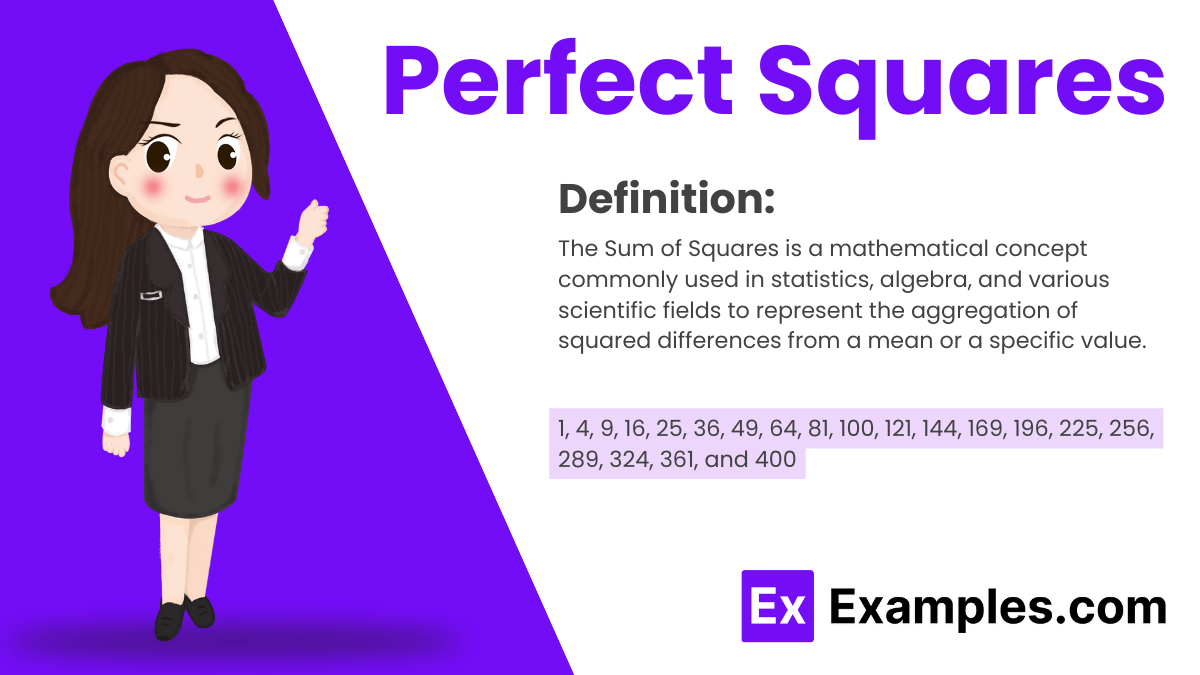
A perfect square is an integer that is the square of an integer. In other words, it is the product of some integer with itself. For example, 16 is a perfect square because it is 4 times 4.
perfect squares are numbers that can be expressed as a product of an integer with itself which ultimately gives us the square of that integer.
P = n × n =n²
Below, you’ll find a comprehensive list of perfect squares ranging from 1 to 100, accompanied by their factors, which are essentially the product of integers.
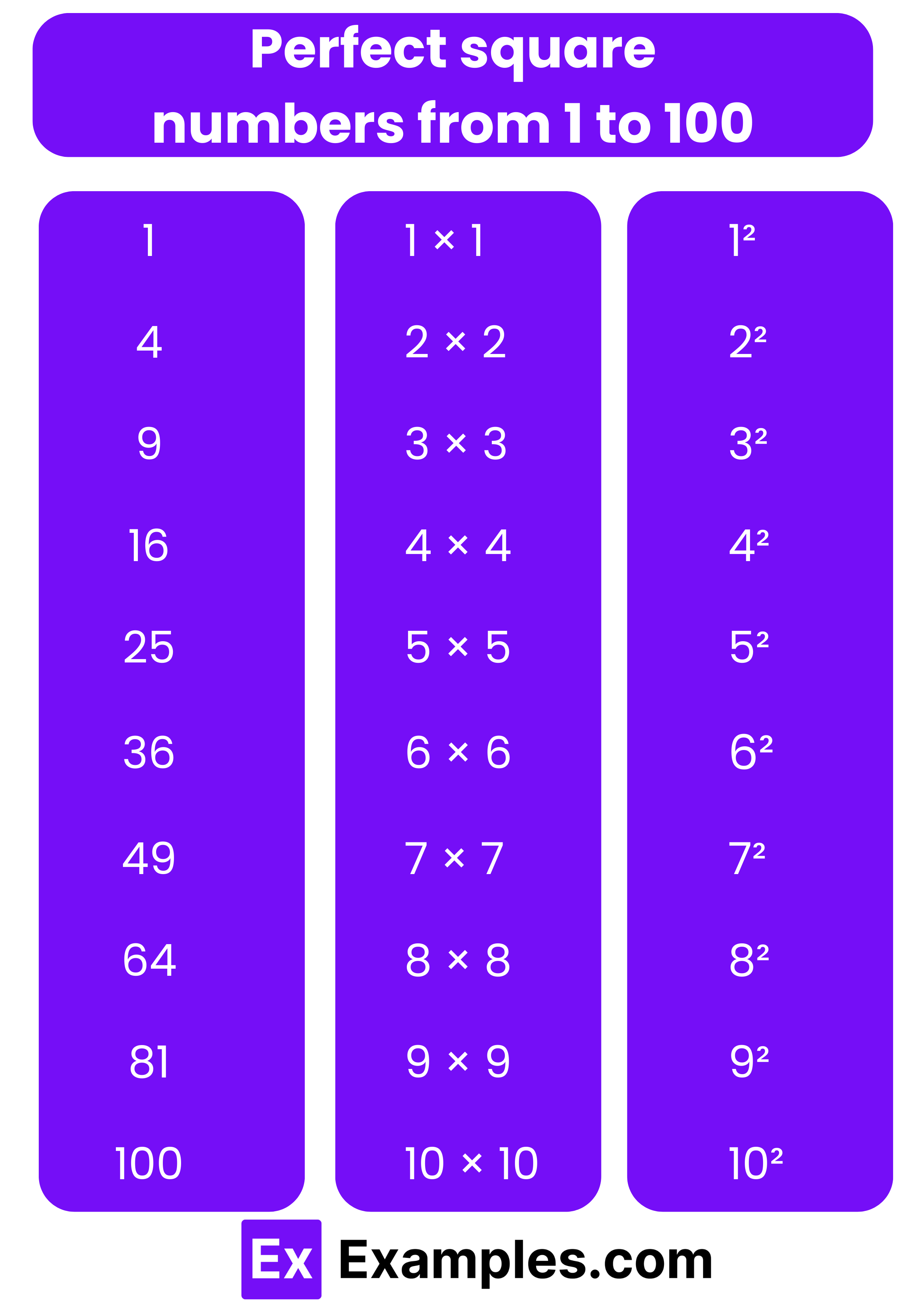
Below is a table of perfect squares, detailing the squares of numbers ranging from 1 to 50.
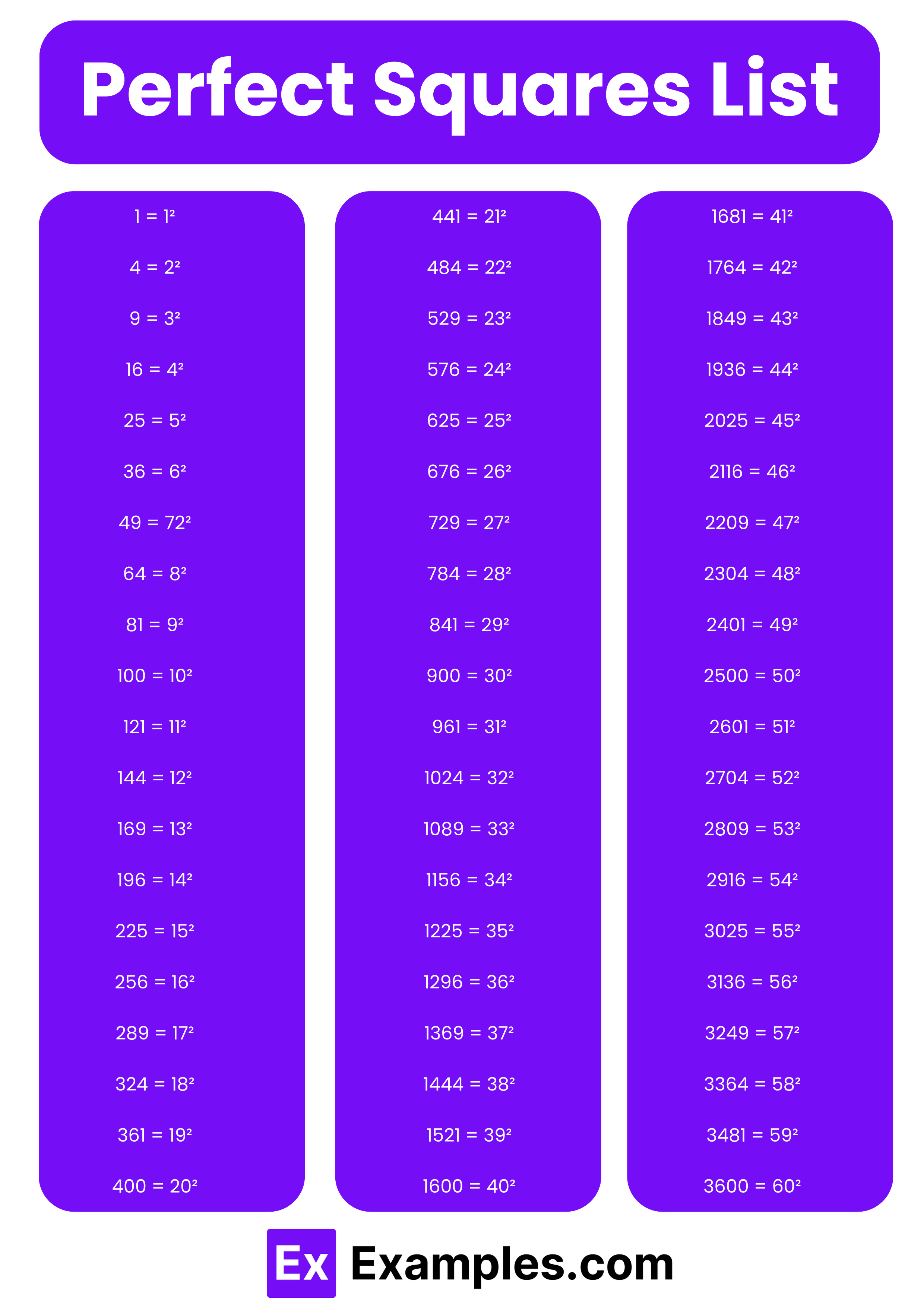
From this analysis, we uncover the formula that reveals the difference between any perfect square and its immediate predecessor. This relationship is encapsulated in the formula:
n² − (n − 1)² = 2n − 1
Additionally, we can calculate the number of square numbers utilizing the formula:
n² = (n − 1)² + (n − 1) + n
Algebraic identities as perfect squares:
a² + 2ab + b² = (a + b)²
a² – 2ab + b² = (a – b)²
Polynomials as perfect squares:
Let us take the polynomial x² + 6x + 9.
Now, factorise the polynomial.
x² + 6x + 9 = x² + 3x + 3x + 9
= x(x + 3) + 3(x + 3)
= (x + 3)(x + 3)
= (x + 3)²
Above examples, we can say that x²+ 6x + 9 is called perfect square trinomials.
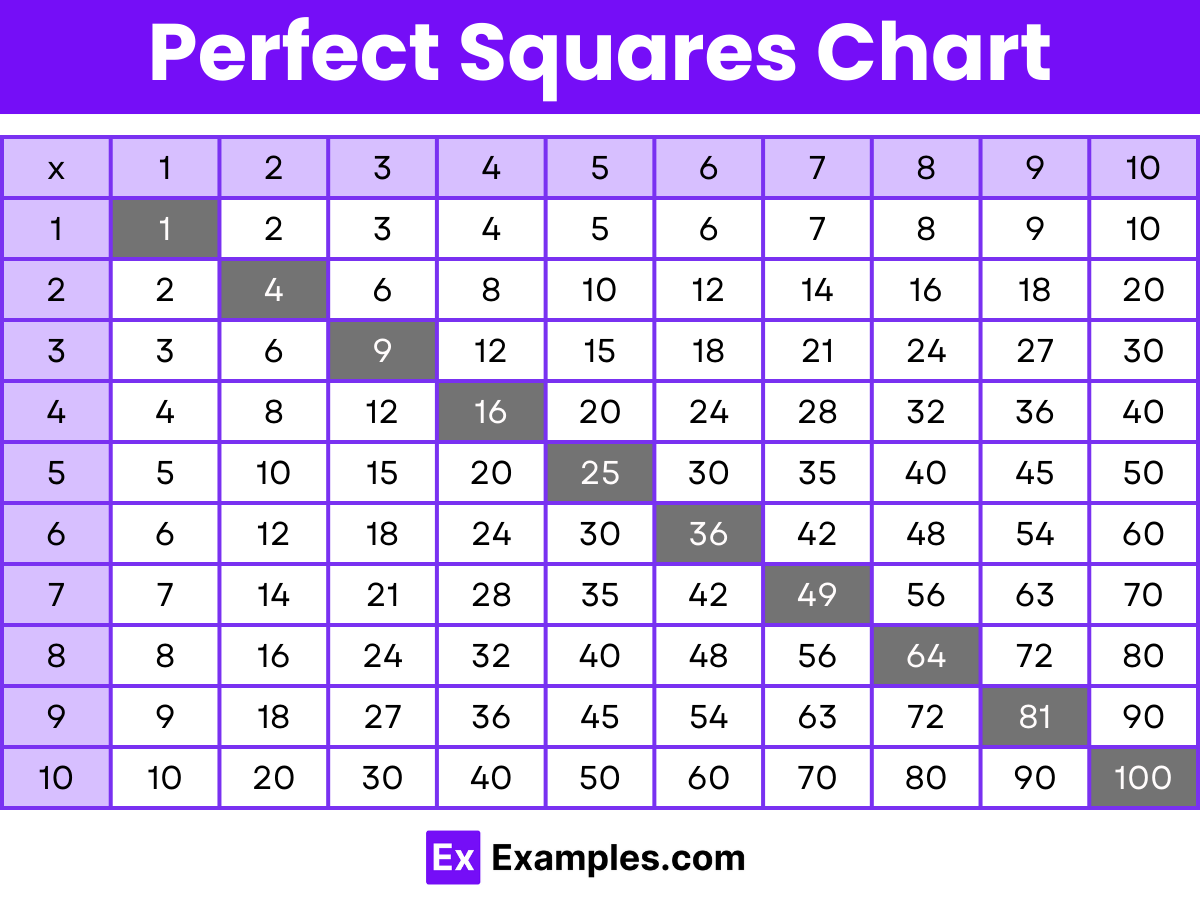
Occasionally, it’s possible to identify the perfect squares of certain numbers without resorting to the lengthy process of long multiplication.
Example 1: Numbers ending with the digit 5
First, divide the two-digit number into its individual digits. Multiply the digit in the tens place by the next consecutive number. Then, take the digit in the units place and square it. Combine these two outcomes to form your result: 85²
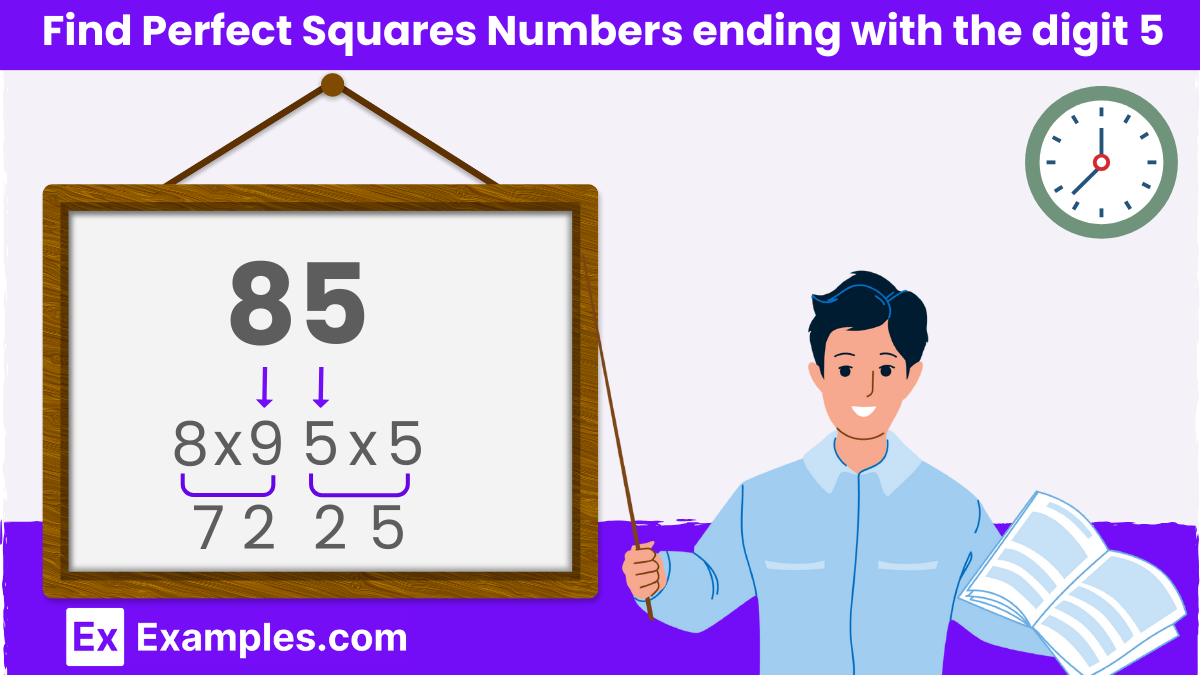
Example 2: Using the formula a² + 2ab + b² = (a + b)²
To calculate the square of large numbers, you can decompose them into more manageable numbers using the aforementioned formula and subsequently expand the expression.
87² = (80+7)²= 80²+ 2.80.7 + 7² = 6400 + 1120 + 49 = 7569
Q1: Is 49 a perfect square?
A1: Yes, 49 is a perfect square because 7×7=49
Q2: What is the next perfect square after 16?
A2: The next perfect square after 16 is 25, because 5×5=25
Q3: Find the square of 8.
A3: The square of 8 is 8×8=64
Q4: Express 121 as a product of an integer with itself.
A4: 121 can be expressed as 11×11
Q5: Which of the following is a perfect square: 18, 36, 52?
A5: 36 is a perfect square (6×6=36).
Q6: Calculate the square of 15.
A6: The square of 15 is 15×15=225
Q7: Is 144 a perfect square? If so, find its square root.
A7: Yes, 144 is a perfect square. Its square root is 12 ,(12×12=144).
Q8: Find the perfect square of 18 using the formula (a + b)² = a² + 2ab + b²
Solution: We will split 18 as (10+8) to use the formula.
Solution: We will split 18 as (10+8) to use the formula.
18 x 18 = 18²
= (10+8)² ……….(a + b)²
= 100 + 160 + 64 ………….. (a + b)² = a² + 2ab + b²
=324
The first 4 perfect squares are 1 (1²), 4 (2²), 9 (3²), and 16 (4²). These numbers represent the squares of the first four positive integers.
The perfect squares from 1 to 1² are 1 (1²), 4 (2²), 9 (3²), 16 (4²), 25 (5²), 36 (6²), 49 (7²), 64 (8²), 81 (9²), 100 (10²), 121 (11²), and 144 (12²).
“20 perfect squares” refers to the square of the number 20, which is 20²=400. However, the term might also be misunderstood as asking for a list of 20 perfect square numbers, which would start from 1² and go up to 20².
Yes, 64 is a perfect square because it is 82. However, 20 is not a perfect square because there is no integer that, when squared, equals 20
In conclusion, perfect squares are fundamental in mathematics, representing numbers that are the product of an integer multiplied by itself. Understanding and identifying them enriches number theory knowledge and enhances problem-solving skills.
Text prompt
Add Tone
10 Examples of Public speaking
20 Examples of Gas lighting
Which of the following is the perfect square of 12?
124
134
144
154
Which of the following numbers is not a perfect square?
81
100
121
130
Which of the following numbers is a perfect square?
81
83
85
87
Find the next perfect square after 100.
110
115
121
125
Which of the following is the perfect square of 14?
176
186
196
206
Which of the following is the smallest perfect square greater than 180?
182
184
190
196
Find the next perfect square after 256.
261
269
272
289
Which of the following numbers is a perfect square?
81
83
85
87
What is the perfect square of 15?
210
225
240
250
Which of the following numbers is not a perfect square?
64
81
100
110
Before you leave, take our quick quiz to enhance your learning!

